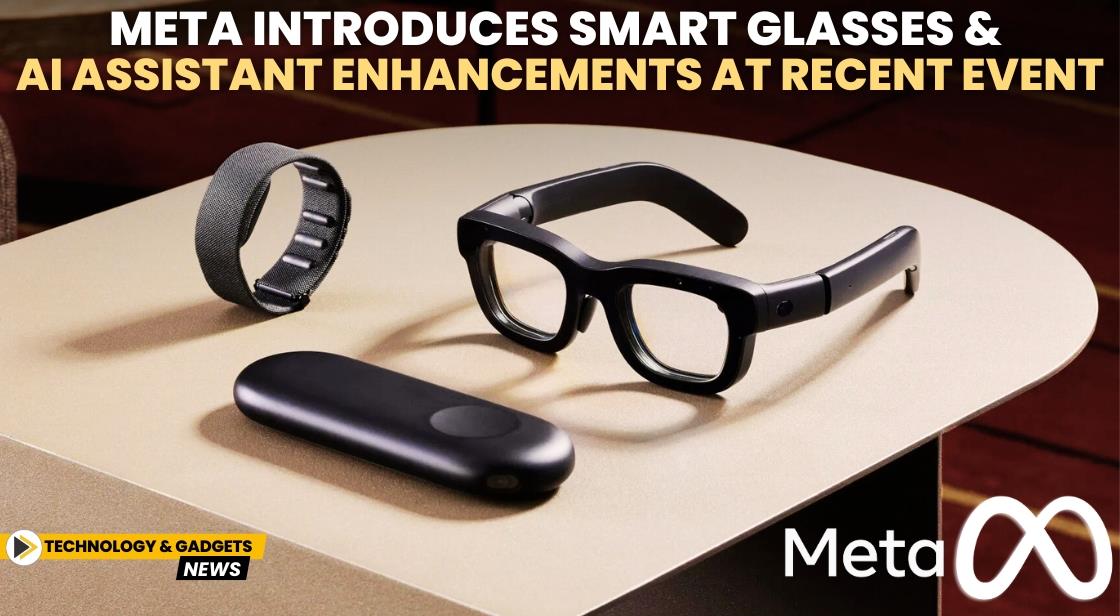Meta Introduces Smart Glasses and AI Assistant Enhancements at Recent Event

News Synopsis
Mark Zuckerberg has committed billions of dollars, enlisted thousands of employees, and dedicated approximately a quarter of his life to realize a vision that blends the physical and digital realms, aiming to connect people across the globe. While this dream may seem distant, recent developments at Meta indicate significant progress in that direction.
At a recent event held at its headquarters in Menlo Park, California, Meta unveiled a range of innovative products, including an updated, budget-friendly version of its Quest 3S virtual reality headset. Additionally, the company introduced prototype smart glasses featuring advanced holographic technology embedded in the lenses. Alongside these hardware advancements, Meta showcased a series of enhancements to its artificial intelligence assistant, Meta AI.
Enhancements to Meta AI
The latest updates to Meta AI will integrate an array of celebrity voices into the assistant, featuring personalities such as Awkwafina, John Cena, and Dame Judi Dench. These voices will respond to user inquiries across many of Meta's major applications, including Instagram, WhatsApp, Messenger, and Facebook. This integration is part of Zuckerberg's broader strategy to merge his vision for social networking with the current capabilities of technology.
Despite some achievements in selling virtual reality headsets and the unexpected success of Ray-Ban augmented reality glasses, Zuckerberg acknowledges that the full realization of the metaverse remains years away. "We can start to see how the future of computing and human connection are going to look," he asserted at the event. "It's happening."
Financial Investments in Reality Labs
Over the past few years, Meta has poured nearly $50 billion into its Reality Labs division, the branch dedicated to hardware development. However, profitability from this venture is not expected in the near term, compounding the already significant costs associated with Meta’s expansion into artificial intelligence and data centers.
Mark Zuckerberg’s vision revolves around creating millions of smart glasses and VR headsets to facilitate a new type of social networking experience for users of his applications. By combining these products with the Meta AI assistant, he hopes to make them compelling enough to encourage regular engagement. Currently, over 400 million users have interacted with Meta AI, and 200 million users engage with the smart assistant weekly on various Meta platforms.
Risks and Innovations
Some of Meta's new initiatives present potential risks. The company plans to introduce AI-generated content into users’ feeds on Facebook and Instagram, a move that may alienate users who prefer organic content. This AI-generated content could range from images tailored to users’ interests based on their browsing behaviors to even photos of the users themselves.
Not all AI ventures have been successful; Meta recently discontinued a product that enabled users to interact with celebrity chatbots, including versions modeled after Snoop Dogg and Tom Brady, after less than a year of operation.
Strategic Partnership and Smart Glasses Features
Meta is banking on its collaboration with EssilorLuxottica, the world’s largest eyewear conglomerate, for the success of its smart glasses. Initial sales have shown promise, and Meta is actively seeking to enhance features further. The new glasses are set to include live translation capabilities, enabling real-time translations in English, Spanish, Italian, and French during conversations. Furthermore, Meta has partnered with Be My Eyes, a service designed to assist individuals with visual impairments by providing audio descriptions of their surroundings through the glasses' cameras.
Project Orion: A New Horizon in Smart Glasses
During the event, Zuckerberg also presented Project Orion, a pair of smart glasses that exceed the capabilities of existing Ray-Bans by incorporating digital technology within the lenses. This advancement aims to enable users to engage in conversations with friends across the globe while viewing their digital avatars as if they were physically present.
Zuckerberg posits that these enhanced glasses could eventually replace smartphones, allowing users to access apps and features typically used on mobile devices without the need to look down at a separate screen. Control options include voice commands, touch gestures, or an experimental "wrist-based neural interface" that utilizes a specialized bracelet coupled with wrist movements.
The Road Ahead for Meta
Although much of Zuckerberg’s vision remains theoretical, and adoption rates have been relatively slow, he maintains an optimistic outlook. He believes that the products introduced at this event will ultimately be welcomed by millions as they become available for hands-on experience. "I think the way to look at these glasses is as a time machine," he remarked. "They are a glimpse of a future that is pretty exciting."
Conclusion
As Meta continues to innovate and push the boundaries of technology, its foray into smart glasses and augmented reality represents a significant step toward realizing the interconnected digital world that Zuckerberg envisions. With ongoing developments in AI and hardware, the company's future looks promising, albeit still in its early stages.
You May Like









